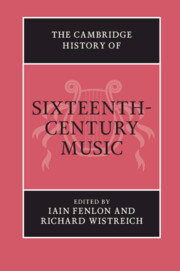34 results
Index
-
- Book:
- The Cambridge History of Sixteenth-Century Music
- Published online:
- 08 January 2019
- Print publication:
- 24 January 2019, pp 502-520
-
- Chapter
- Export citation
Maps
-
- Book:
- The Cambridge History of Sixteenth-Century Music
- Published online:
- 08 January 2019
- Print publication:
- 24 January 2019, pp xvii-xxii
-
- Chapter
- Export citation
Introduction
-
-
- Book:
- The Cambridge History of Sixteenth-Century Music
- Published online:
- 08 January 2019
- Print publication:
- 24 January 2019, pp 1-24
-
- Chapter
- Export citation
5 - Music and War
- from Part I - Confessions, Identities, and Rhetorics of Power
-
-
- Book:
- The Cambridge History of Sixteenth-Century Music
- Published online:
- 08 January 2019
- Print publication:
- 24 January 2019, pp 176-206
-
- Chapter
- Export citation
Notes on the Contributors
-
- Book:
- The Cambridge History of Sixteenth-Century Music
- Published online:
- 08 January 2019
- Print publication:
- 24 January 2019, pp xi-xiv
-
- Chapter
- Export citation
Part II - Culture, Place, and Practice
-
- Book:
- The Cambridge History of Sixteenth-Century Music
- Published online:
- 08 January 2019
- Print publication:
- 24 January 2019, pp 207-378
-
- Chapter
- Export citation
Copyright page
-
- Book:
- The Cambridge History of Sixteenth-Century Music
- Published online:
- 08 January 2019
- Print publication:
- 24 January 2019, pp iv-iv
-
- Chapter
- Export citation
Abbreviations
-
- Book:
- The Cambridge History of Sixteenth-Century Music
- Published online:
- 08 January 2019
- Print publication:
- 24 January 2019, pp xvi-xvi
-
- Chapter
- Export citation
Part III - Institutions, Ideas, and the Order of Nature
-
- Book:
- The Cambridge History of Sixteenth-Century Music
- Published online:
- 08 January 2019
- Print publication:
- 24 January 2019, pp 379-501
-
- Chapter
- Export citation
Acknowledgements
-
- Book:
- The Cambridge History of Sixteenth-Century Music
- Published online:
- 08 January 2019
- Print publication:
- 24 January 2019, pp xv-xv
-
- Chapter
- Export citation
Part I - Confessions, Identities, and Rhetorics of Power
-
- Book:
- The Cambridge History of Sixteenth-Century Music
- Published online:
- 08 January 2019
- Print publication:
- 24 January 2019, pp 25-206
-
- Chapter
- Export citation
Contents
-
- Book:
- The Cambridge History of Sixteenth-Century Music
- Published online:
- 08 January 2019
- Print publication:
- 24 January 2019, pp v-vi
-
- Chapter
- Export citation
Maps and Figures
-
- Book:
- The Cambridge History of Sixteenth-Century Music
- Published online:
- 08 January 2019
- Print publication:
- 24 January 2019, pp vii-x
-
- Chapter
- Export citation
8 - The Lives of Musicians
- from Part II - Culture, Place, and Practice
-
-
- Book:
- The Cambridge History of Sixteenth-Century Music
- Published online:
- 08 January 2019
- Print publication:
- 24 January 2019, pp 288-334
-
- Chapter
- Export citation

The Cambridge History of Sixteenth-Century Music
-
- Published online:
- 08 January 2019
- Print publication:
- 24 January 2019
Performance Practice Scholarship
- from P
-
-
- Book:
- The Cambridge Encyclopedia of Historical Performance in Music
- Published online:
- 29 August 2018
- Print publication:
- 06 September 2018, pp 476-501
-
- Chapter
- Export citation
17 - Vocal performance in the seventeenth century
- from PART IV - PERFORMANCE IN THE SEVENTEENTH CENTURY
-
-
- Book:
- The Cambridge History of Musical Performance
- Published online:
- 28 March 2012
- Print publication:
- 16 February 2012, pp 398-420
-
- Chapter
- Export citation
Selected discography
-
-
- Book:
- The Cambridge Companion to Monteverdi
- Published online:
- 28 September 2011
- Print publication:
- 13 December 2007, pp 310-313
-
- Chapter
- Export citation
Preface
-
-
- Book:
- The Cambridge Companion to Monteverdi
- Published online:
- 28 September 2011
- Print publication:
- 13 December 2007, pp xiv-xv
-
- Chapter
- Export citation
Frontmatter
-
- Book:
- The Cambridge Companion to Monteverdi
- Published online:
- 28 September 2011
- Print publication:
- 13 December 2007, pp i-v
-
- Chapter
- Export citation



